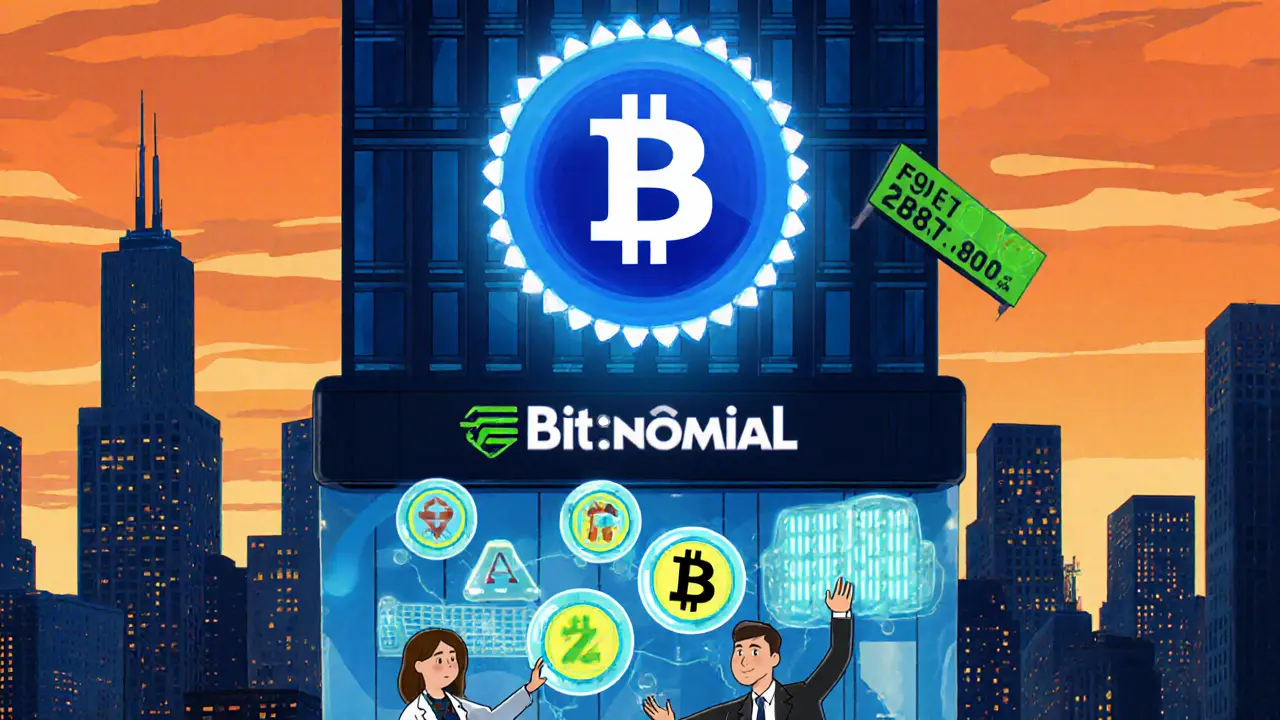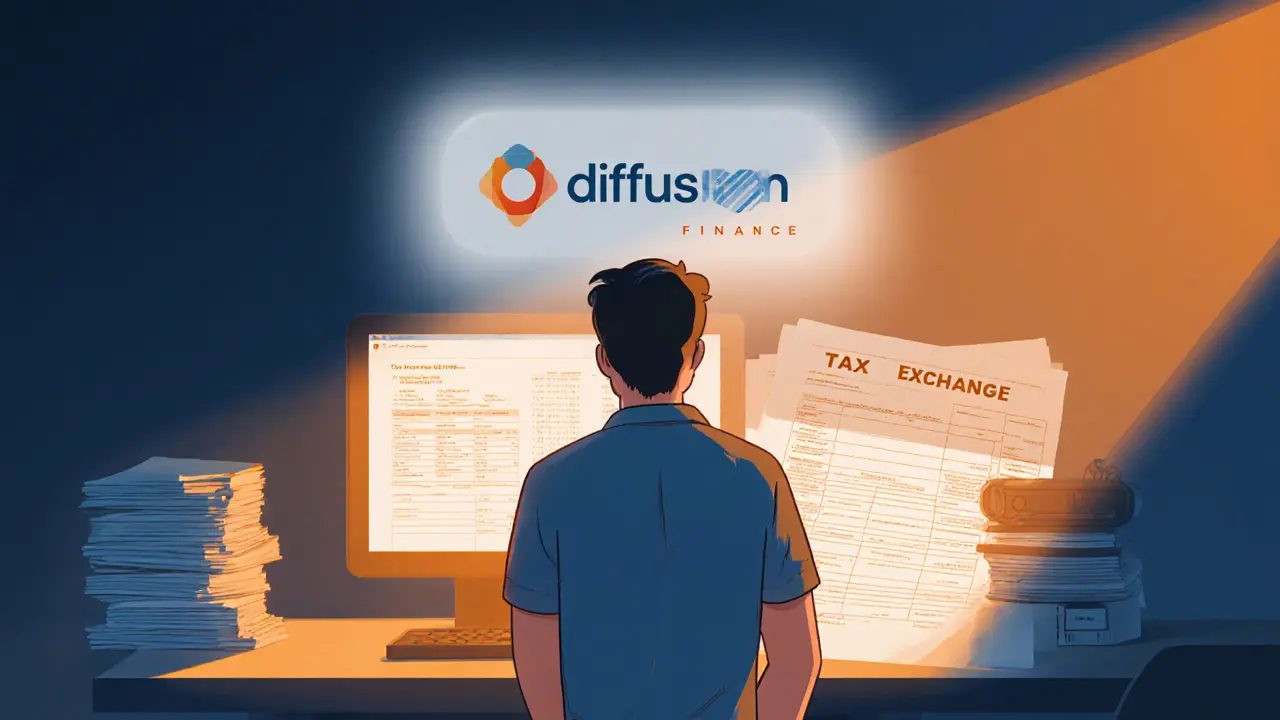
- 25 Mar 2025
- Elara Crowthorne
- 18
Bitnomial Product Comparison Tool
Select an exchange and feature to compare their offerings.
Regulatory Depth
Bitnomial holds DCM, FCM, and DCO licenses from CFTC
Physical Delivery
Delivers actual tokens upon contract expiry
Crypto Margin
Accepts BTC and ETH as margin collateral
Key Benefits of Bitnomial
- Institutional-grade regulatory compliance
- Physically delivered contracts ensure ownership
- Reduced counterparty risk through in-house clearing
- Efficient margin usage with crypto collateral
When you hear the name Bitnomial is a Chicago‑based exchange that trades physically delivered crypto futures, options, and perpetual contracts under full CFTC oversight, you know you’re looking at a platform that’s trying to bring Wall Street‑style rigor to the crypto world. Launched in 2014, Bitnomial has spent the last decade stacking licenses, building a clearinghouse, and adding products that most offshore rivals still only offer on a cash‑settled basis. In this review we’ll break down what makes Bitnomian different, who should actually use it, and where the platform might stumble as the market evolves.
Why Bitnomial Exists - A Regulatory First
Most crypto exchanges operate in a gray zone, but Bitnomial chose the opposite route. It became a designated contract market (DCM) with the CFTC on April 17, 2020, giving it permission to list margined, physically settled futures and options. In 2023 the company’s clearing house was registered as a derivatives clearing organization (DCO), making Bitnomial the only crypto‑native platform with the full suite of CFTC licenses - exchange, clearing, and futures commission merchant. That regulatory depth translates into three practical benefits:
- Institutional clients can meet AML/KYC requirements without a maze of third‑party services.
- Physical delivery ensures you actually own the underlying BTC, ETH, or USDC after a contract expires, rather than a paper claim.
- Clearinghouse integration reduces counter‑party risk because trades settle through a single, U.S.‑regulated entity.
Product Suite - Crypto Complex® and Stablecoin Complex™
The heart of Bitnomial’s offering lives in two product families.
- Crypto Complex®: This bundle delivers the first U.S. XRP futures, first U.S. Cardano (ADA) futures, and the world’s first physically delivered Solana (SOL) futures. It also hosts Bitcoin (BTC) and Ethereum (ETH) futures with standardized contract sizes aimed at institutions.
- Stablecoin Complex™: Launched in early 2024, it introduced physically settled USDC futures - a game‑changer for corporate treasuries that want hedged exposure without leaving the regulated sphere.
Both complexes share a common technical backbone: a 25‑year term perpetual contract with an 8‑hour funding interval, a design that mirrors offshore markets while staying compliant with U.S. margin rules.
Margin Collateral - Crypto as Real Collateral
On September 25, 2025, Bitnomial became the first CFTC‑regulated exchange to accept digital assets as margin. Bitcoin and Ethereum can now be posted as collateral, subject to haircuts that reflect market volatility. In practice, that means a hedge fund holding a sizable BTC stash can lock up 30‑40% less USD‑based collateral while still meeting margin requirements. The result is better capital efficiency and a lower likelihood of forced liquidation during market swings.

Technology and Infrastructure
Bitnomial runs its own settlement engine, a rare feat in the crypto space where most platforms outsource clearing to third parties. The internal engine handles physical delivery by moving the actual blockchain assets on contract expiry, which eliminates the “synthetic” risk you see on cash‑settled platforms. For high‑frequency traders, the exchange offers low‑latency order books, professional‑grade API access, and a dedicated FIX gateway - features typically reserved for traditional futures markets.
How Bitnomial Stacks Up - A Quick Comparison
| Feature | Bitnomial | Coinbase Pro | Kraken Futures |
|---|---|---|---|
| Regulatory Status | CFTC‑designated DCM, DCO, FCM | CFTC registered, cash‑settled only | CFTC registered, cash‑settled only |
| Physical Delivery | Yes - BTC, ETH, SOL, USDC, XRP, ADA | No | No |
| Crypto as Margin | BTC & ETH accepted (2025) | No | No |
| Perpetual Funding Interval | 8‑hour | 8‑hour | 8‑hour |
| Stablecoin Futures | USDC (physically settled) | None | None |
| Clearinghouse | In‑house (registered DCO) | Third‑party | Third‑party |
Who Should Trade on Bitnomial?
Because the platform leans heavily on institutional‑grade tools, the sweet spot is:
- Prop trading desks that need regulated exposure to Bitcoin and other altcoins.
- Corporate treasury teams that want to hedge USDC holdings with futures instead of moving cash.
- Hedge funds looking to post existing crypto balances as margin to free up USD collateral.
Casual retail traders might find the onboarding process more rigorous than on a typical spot‑exchange, and the contract sizes (e.g., 0.1BTC per futures contract) can feel large for a newcomer.

Recent Highlights and Future Outlook
Two headline‑making moves in the past year illustrate Bitnomial’s ambition:
- Botanical Platform Launch: In October 2024, Bitnomial rolled out a retail‑focused perpetual futures venue called Botanical, backed by a $25million round led by Ripple. The platform aims to bring regulated perpetuals to everyday traders without the need for VPNs or offshore accounts.
- Legal Push‑back Against the SEC: After the SEC flagged Bitnomial’s XRP futures as a potential security, the exchange sued the regulator in October 2024, arguing that the contracts are bona fide derivatives under CFTC jurisdiction. The case is still pending but signals Bitnomial’s willingness to fight for its product suite.
Looking ahead, the company plans to expand the Stablecoin Complex™ beyond USDC, potentially adding Tether (USDT) and Dai futures once regulatory clarity arrives. With the clearinghouse already handling settlement, adding new contracts should be a smooth technical exercise.
Potential Drawbacks
Nothing is perfect. Here are a few points that could give a pause:
- Limited Retail Experience: Although Botanical tries to bridge that gap, the core exchange still feels tailored to sophisticated users.
- Regulatory Risk: Ongoing litigation with the SEC could result in product bans or fines, which would affect liquidity.
- Liquidity Compared to Offshore Giants: Bitnomial’s order books are deep for BTC and ETH but thin for newer alt‑coin futures like SOL or ADA, meaning slippage can be higher than on Binance or Bybit.
Bottom Line - Is Bitnomial Worth Your Time?
If you’re an institution or a high‑net‑worth crypto holder who values regulatory certainty, physical delivery, and the ability to use your own BTC/ETH as margin, Bitnomial is probably the only U.S. platform that meets those needs today. For pure‑play retail traders who just want to buy a coin on an app, the platform’s extra steps and larger contract sizes may feel cumbersome. In short, the exchange excels in the niche it set out to dominate - regulated crypto derivatives - and it’s likely to stay there as long as the CFTC keeps granting its licenses.
Frequently Asked Questions
What licenses does Bitnomial hold?
Bitnomial is a CFTC‑designated contract market (DCM), a registered futures commission merchant (FCM), and operates a derivatives clearing organization (DCO) that’s also registered with the CFTC.
Can I trade Bitcoin futures on Bitnomial as a retail user?
Yes, but you’ll need to complete CFTC‑level KYC, meet margin requirements, and trade in the standard contract size (0.1BTC per contract). Retail‑focused perpetuals are available on the Botanical platform.
Does Bitnomial offer stablecoin futures?
Yes, the Stablecoin Complex™ currently offers physically settled USDC futures. The roadmap includes adding other major stablecoins once regulatory guidance is clear.
How does the margin haircut work for crypto collateral?
Bitnomial applies a risk‑based haircut - roughly 30% for Bitcoin and 35% for Ethereum - to account for price volatility. The remaining value counts toward your margin requirement.
Is physical delivery really different from cash‑settlement?
With physical delivery, the underlying token is transferred on‑chain to the contract holder at expiry. Cash‑settled contracts simply pay out a USD‑denominated profit or loss, leaving the token untouched.




18 Comments
When you first read about a U.S. exchange that actually delivers the crypto you trade, it's like watching a sunrise after a long night of fog. Bitnomial’s CFTC licenses feel like a badge of honor in a Wild West market. The fact that they hold DCM, DCO, and FCM statuses simultaneously is nothing short of revolutionary. Institutional investors can finally sleep without fearing a sudden regulatory ambush. Physical delivery transforms futures from paper promises into real ownership, and that changes the game entirely. Using BTC and ETH as margin collateral slashes the cash you need to lock up, freeing capital for other strategies. Their in‑house clearinghouse trims counter‑party risk like a surgeon excising a tumor. The 8‑hour funding interval mirrors offshore markets while staying within U.S. rules, offering the best of both worlds. The newly launched Botanical platform promises retail access without compromising compliance, bridging a massive gap. Even the Stablecoin Complex™ with USDC futures brings hedging to corporate treasuries that once dreaded crypto exposure. Bitnomial’s order books, API, and FIX gateway give high‑frequency traders the tools they crave. The litigation with the SEC shows they’re ready to fight for the legitimacy of their products. As the market matures, having a regulated backbone could be the moat that keeps them ahead of offshore giants. For anyone serious about crypto derivatives, this exchange reads like a beacon of hope. In short, the blend of regulation, physical delivery, and innovative margin solutions makes Bitnomial a landmark in American crypto finance.
Sure, regulated sounds shiny, but remember that every new compliance layer adds latency and cost. The fees on Bitnomial can eat into tight spreads, especially for smaller players. Still, the safety net might be worth it for those who can afford the premium.
The so‑called “regulatory first” claim is just marketing fluff. Bitnomial’s licenses don’t magically solve liquidity issues, and their order books are still thin on the alt‑coin side. Physical delivery sounds nice until you’re stuck with a settlement delay on a laggy blockchain. Their margin haircuts are aggressive, meaning you’re effectively over‑collateralizing. Bottom line: don’t let the hype blind you.
Oh absolutely, because nothing screams “solid platform” like a thin market and fancy paperwork.
i totally get why some folks are hesitant – the KYC can feel like a nightmare and the contract sizes are kinda big. but if you have some btc lying around, using it as margin could actually save you a lot of cash. also, the physical delivery means you really own the coin at expiry, which is pretty cool. just make sure you read the haircuts so you don’t get surprised. hope this helps!
Bitnomial’s regulatory framework provides a clear compliance pathway for institutions seeking exposure to cryptocurrency derivatives. By holding the CFTC‑designated DCM, DCO, and FCM licenses, the exchange satisfies AML/KYC requirements without reliance on third‑party custodians. The physically settled contracts ensure that holders receive the underlying assets upon expiry, mitigating settlement risk inherent to cash‑settled products. Margining with BTC and ETH introduces capital efficiency, though participants must account for the prescribed haircuts. Additionally, the in‑house clearinghouse consolidates trade settlement, reducing counterparty exposure. Market participants should assess the depth of order books for less‑liquid alt‑coin futures, as slippage may be a concern. Overall, Bitnomial represents a significant step toward regulated crypto derivatives within the United States.
They say it’s regulated, but who’s really watching the watchers?
Probably the same folks who invented the SEC.
From a technical perspective, Bitnomial’s integration of a proprietary settlement engine aligns with deterministic finality guarantees, thereby alleviating the “synthetic” risk profile typical of cash‑settled derivatives. The utilization of an 8‑hour funding interval mirrors the funding mechanisms employed by major offshore futures venues, ensuring price convergence while remaining compliant with CFTC margin requirements. Moreover, the acceptance of BTC and ETH as margin collateral introduces a multi‑asset collateralization framework, which, when coupled with risk‑based haircuts, enhances capital efficiency for market makers. However, the limited depth in SOL and ADA contract markets suggests potential order‑book fragmentation, which could impact execution quality for high‑frequency strategies.
It’s interesting-while everyone lauds the regulatory compliance, the reality is that the SEC’s recent actions could jeopardize exactly those futures contracts that Bitnomial touts as “physically delivered.”; moreover, the litigation process might create uncertainty, leading traders to withdraw liquidity; consequently, the platform’s depth could suffer, especially in the newer alt‑coin futures.
Bitnomial’s approach bridges the gap between traditional finance and the crypto ecosystem, offering a regulated venue that respects both U.S. compliance standards and the innovative spirit of digital assets. By providing physically settled contracts, the exchange empowers users to truly own the underlying tokens, which aligns with the cultural emphasis on decentralization. The inclusion of USDC futures further broadens the appeal to corporate treasuries seeking stablecoin exposure without sacrificing regulatory oversight. For international traders, the platform’s clear licensing can simplify cross‑border participation, reducing the need for multiple jurisdictional registrations. Overall, Bitnomial serves as a model for how regulated crypto derivatives can coexist with broader financial markets.
Indeed, the harmonization of U.S. regulatory rigor with crypto’s inherent flexibility positions Bitnomial as a catalyst for mainstream adoption; institutions can engage with confidence, knowing that their activities are underpinned by CFTC oversight while still leveraging the operational efficiencies of blockchain‑based settlement.
It’s downright infuriating how many platforms dodge responsibility, pretending to be “innovators” while leaving users exposed to unchecked risk 😡. Bitnomial actually steps up, taking on the regulatory burden that most would shy away from. This kind of accountability should be the baseline, not the exception. Anyone who ignores the importance of physical delivery and proper clearing is essentially endorsing a dangerous game of chance. Let’s hope more exchanges follow suit before the next wave of scandal hits the crypto world.
Great overview-especially helpful for newcomers looking to understand the regulatory landscape.
i think it’s cool that you can actually get the real coin after a futures contract ends. makes the whole thing feel less like a gamble and more like actual investing. just watch out for those margin haircut numbers, they can bite if you’re not careful.
Wow-what a comprehensive platform!; the combination of physical delivery, crypto‑as‑margin, and in‑house clearing really sets Bitnomial apart; it’s exactly the kind of evolution the market has needed for years; investors can finally breathe easier knowing there’s a solid regulatory backbone backing their trades.
I understand that the extra KYC steps can feel cumbersome, but they also protect you from potential fraud and ensure compliance with U.S. law. If you’re concerned about contract sizes, you might start with the smaller retail‑focused Botanical venue, which offers more accessible perpetuals. Also, keep an eye on the liquidity levels for the newer alt‑coin futures, as they tend to be thinner. Feel free to reach out if you have any more questions about navigating the platform.
These foreign exchanges are screwing us over, but Bitnomial finally puts America back on top of crypto trading – if they keep their regs tight, the rest of the world will have to follow.